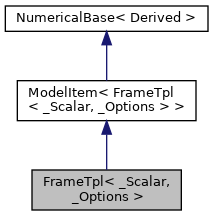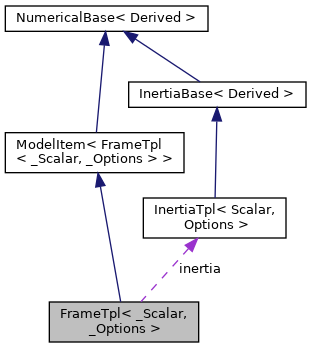A Plucker coordinate frame attached to a parent joint inside a kinematic tree. More...
#include <pinocchio/multibody/frame.hpp>


Public Types | |
| enum | { Options = traits<ModelItemDerived>::Options } |
| typedef ModelItem< ModelItemDerived > | Base |
| typedef InertiaTpl< Scalar, Options > | Inertia |
| typedef pinocchio::JointIndex | JointIndex |
| typedef FrameTpl< _Scalar, _Options > | ModelItemDerived |
| typedef traits< ModelItemDerived >::Scalar | Scalar |
| typedef SE3Tpl< Scalar, Options > | SE3 |
 Public Types inherited from ModelItem< FrameTpl< _Scalar, _Options > > Public Types inherited from ModelItem< FrameTpl< _Scalar, _Options > > | |
| enum | |
| typedef traits< FrameTpl< _Scalar, _Options > >::Scalar | Scalar |
| typedef SE3Tpl< Scalar, Options > | SE3 |
 Public Types inherited from NumericalBase< Derived > Public Types inherited from NumericalBase< Derived > | |
| typedef traits< Derived >::Scalar | Scalar |
Public Member Functions | |
| PINOCCHIO_COMPILER_DIAGNOSTIC_PUSH PINOCCHIO_COMPILER_DIAGNOSTIC_IGNORED_DEPRECECATED_DECLARATIONS | FrameTpl () |
| Default constructor of a frame. | |
| PINOCCHIO_COMPILER_DIAGNOSTIC_POP PINOCCHIO_COMPILER_DIAGNOSTIC_PUSH PINOCCHIO_COMPILER_DIAGNOSTIC_IGNORED_DEPRECECATED_DECLARATIONS | FrameTpl (const FrameTpl &other) |
| Copy constructor. | |
| template<typename S2 , int O2> | |
| PINOCCHIO_COMPILER_DIAGNOSTIC_POP PINOCCHIO_COMPILER_DIAGNOSTIC_PUSH PINOCCHIO_COMPILER_DIAGNOSTIC_IGNORED_DEPRECECATED_DECLARATIONS | FrameTpl (const FrameTpl< S2, O2 > &other) |
| Copy constructor by casting. | |
| PINOCCHIO_COMPILER_DIAGNOSTIC_POP PINOCCHIO_COMPILER_DIAGNOSTIC_PUSH PINOCCHIO_COMPILER_DIAGNOSTIC_IGNORED_DEPRECECATED_DECLARATIONS | FrameTpl (const std::string &name, const JointIndex parent_joint, const FrameIndex parent_frame, const SE3 &frame_placement, const FrameType type, const Inertia &inertia=Inertia::Zero()) |
| Builds a frame defined by its name, its joint parent id, its placement and its type. | |
| PINOCCHIO_COMPILER_DIAGNOSTIC_POP PINOCCHIO_COMPILER_DIAGNOSTIC_PUSH PINOCCHIO_COMPILER_DIAGNOSTIC_IGNORED_DEPRECECATED_DECLARATIONS | FrameTpl (const std::string &name, const JointIndex parentJoint, const SE3 &frame_placement, const FrameType type, const Inertia &inertia=Inertia::Zero()) |
| Builds a frame defined by its name, its joint parent id, its placement and its type. | |
| template<typename NewScalar > | |
| FrameTpl< NewScalar, Options > | cast () const |
| template<typename S2 , int O2> | |
| bool | operator!= (const FrameTpl< S2, O2 > &other) const |
| PINOCCHIO_COMPILER_DIAGNOSTIC_POP FrameTpl< Scalar, Options > & | operator= (const FrameTpl< Scalar, Options > &other) |
| Copy assignment operator. It needs to be user-define because references cannot be re-assigned during copy. | |
| template<typename S2 , int O2> | |
| bool | operator== (const FrameTpl< S2, O2 > &other) const |
| Equality comparison operator. | |
 Public Member Functions inherited from ModelItem< FrameTpl< _Scalar, _Options > > Public Member Functions inherited from ModelItem< FrameTpl< _Scalar, _Options > > | |
| ModelItem () | |
| Default constructor of ModelItem. | |
| ModelItem (const std::string &name, const JointIndex parent_joint, const FrameIndex parent_frame, const SE3 &frame_placement) | |
| Builds a kinematic element defined by its name, its joint parent id, its parent frame id and its placement. | |
| bool | operator== (const ModelItem &other) const |
Public Attributes | |
| Inertia | inertia |
| Inertia information attached to the frame. This inertia will be appended to the inertia supported by the parent joint when calling ModelTpl::addFrame. It won't be processed otherwise by the algorithms. | |
| std::string | name |
| Name of the kinematic element. | |
| PINOCCHIO_DEPRECATED JointIndex & | parent |
| Index of the parent joint. | |
| FrameIndex | parentFrame |
| Index of the parent frame. | |
| JointIndex | parentJoint |
| Index of the parent joint. | |
| SE3 | placement |
| Position of kinematic element in parent joint frame. | |
| PINOCCHIO_DEPRECATED FrameIndex & | previousFrame |
| Index of the previous frame. | |
| FrameType | type |
| Type of the frame. | |
 Public Attributes inherited from ModelItem< FrameTpl< _Scalar, _Options > > Public Attributes inherited from ModelItem< FrameTpl< _Scalar, _Options > > | |
| std::string | name |
| Name of the kinematic element. | |
| FrameIndex | parentFrame |
| Index of the parent frame. | |
| JointIndex | parentJoint |
| Index of the parent joint. | |
| SE3 | placement |
| Position of kinematic element in parent joint frame. | |
A Plucker coordinate frame attached to a parent joint inside a kinematic tree.
|
inline |
|
inline |
Builds a frame defined by its name, its joint parent id, its placement and its type.
| [in] | name | Name of the frame. |
| [in] | parent | Index of the parent joint in the kinematic tree. |
| [in] | frame_placement | Placement of the frame wrt the parent joint frame. |
| [in] | type | The type of the frame, see the enum FrameType. |
| [in] | inertia | Inertia info attached to the frame. |
|
inline |
Builds a frame defined by its name, its joint parent id, its placement and its type.
| [in] | name | Name of the frame. |
| [in] | parent | Index of the parent joint in the kinematic tree. |
| [in] | parentFrame | Index of the parent frame in the kinematic tree. |
| [in] | frame_placement | Placement of the frame wrt the parent joint frame. |
| [in] | type | The type of the frame, see the enum FrameType. |
| [in] | inertia | Inertia info attached to the frame. |
Inertia information attached to the frame. This inertia will be appended to the inertia supported by the parent joint when calling ModelTpl::addFrame. It won't be processed otherwise by the algorithms.
Name of the kinematic element.
Definition at line 25 of file model-item.hpp.
Index of the parent joint.
Index of the parent frame.
Parent frame may be unset (to the std::numeric_limits<FrameIndex>::max() value) as it is mostly used as a documentation of the tree, or in third-party libraries. The URDF parser of Pinocchio is setting it to the proper value according to the urdf link-joint tree. In particular, anchor joints of URDF would cause parent frame to be different to joint frame.
Definition at line 36 of file model-item.hpp.
Index of the parent joint.
Definition at line 28 of file model-item.hpp.
Position of kinematic element in parent joint frame.
Definition at line 39 of file model-item.hpp.
Index of the previous frame.